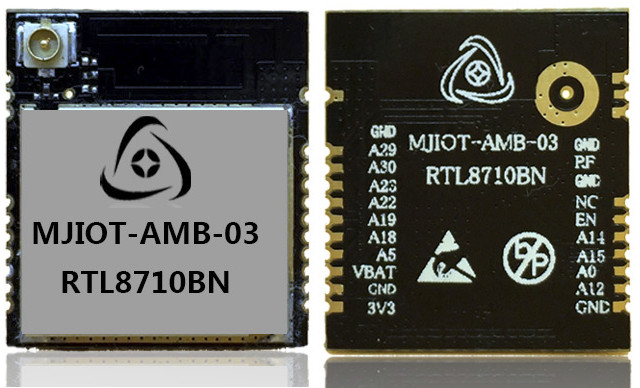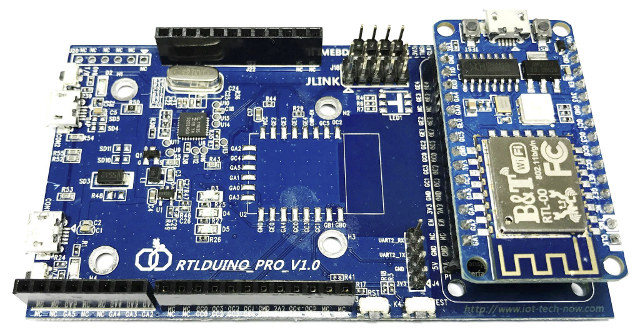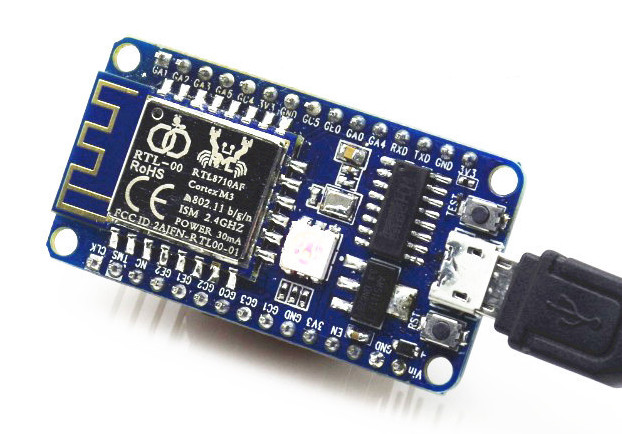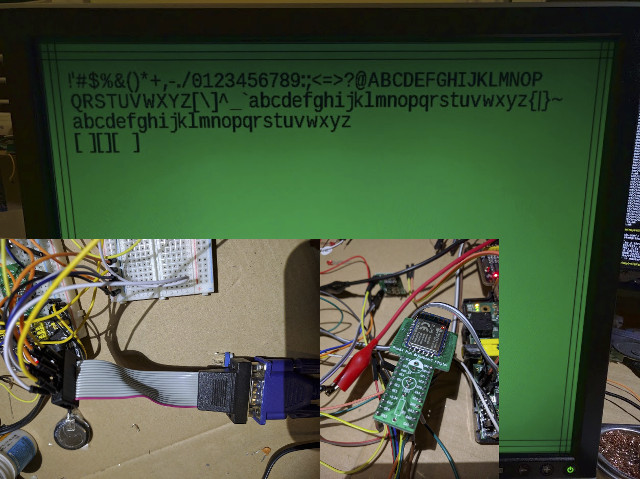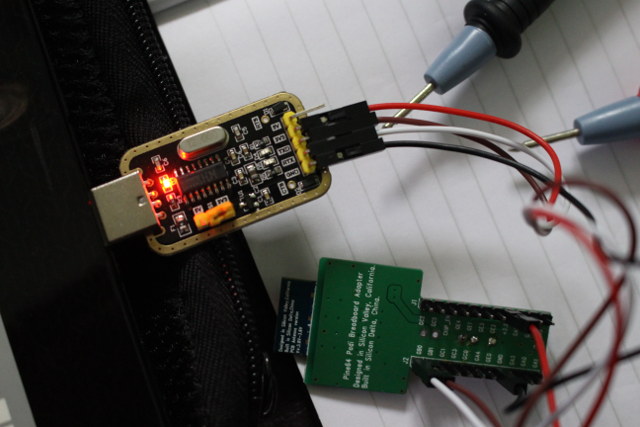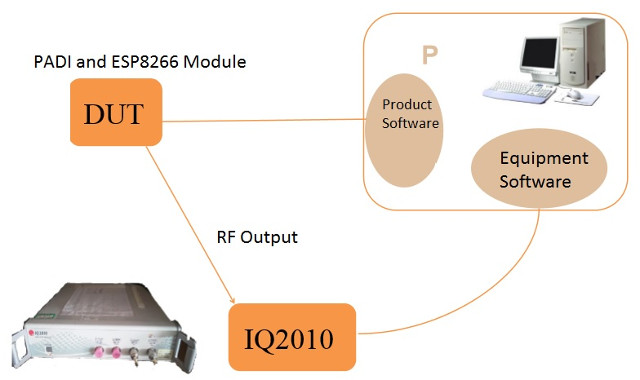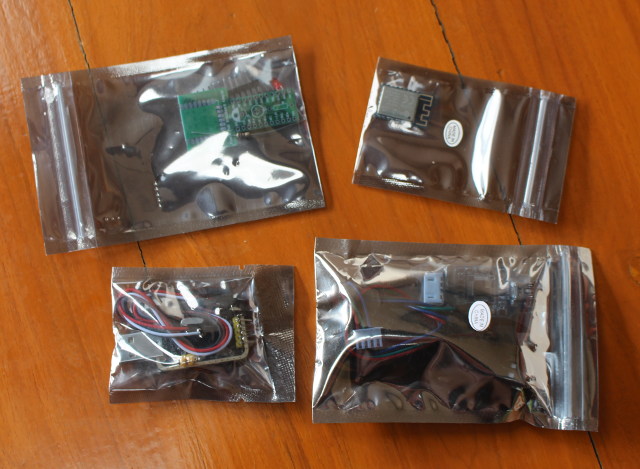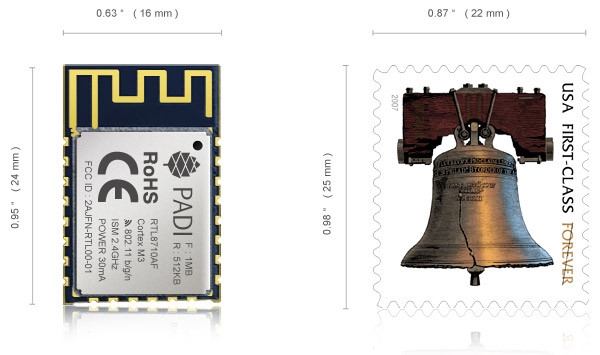We’ve already covered Realtek Ameba ARM Cortex M3 WiSoC several times with their RTL8710AF, RTL8711AM and RT8195AM solutions, but the company has now a new “Ameba Z series” relying on an ARM Cortex M4 core starting with RTL8711BN MCU. RTL8710BN specifications as listed on Realtek website: CPU – ARM Cortex-M4(F) up to 125MHz with FPU (TBC) Memory – 256KB embedded SRAM Storage – 512KB embedded ROM, external flash interface; XIP (eXecut In Place) support Wi-Fi 2.4GHz 1T1R 802.11b/g/n up to 150Mbps; 20MHz and 40MHz WEP, WPA, WPA2, WPS support Security engine – MD5, SHA-1, SHA2-256, DES, 3DES, AES Peripheral Interfaces SDIO Slave 2x UART SPI interface (Master/Slave) 2x I2C interface ADC for voltage management 5x PWM Up to 17x GPIOs Package – QFN-32; 5 x 5 mm AFAIK, other Ameba MCUs do not support XIP, but RTL8710BN and this lowers memory requirements since code can be executed from storage. MJIOT-AMB-03 module […]
RTL8710 Ameba Arduino Development Board and Ameba Arduino v2.0.0 SDK Released
We’ve already seen a NodeMCU lookalike board called RTLDuino based on Realtek RTL8710AF ARM Cortex M3 WiSoC earlier this month, that can be programmed with a community supported Arduino port also called rtlduino via a JLink SWD debugger, but now Realtek has just launched Ameba RTL8710 Arduino board, and released Ameba Arduino v2.0.0 SDK which brings official Arduino support to RTL8710AF platforms. There appears to be two versions of the development kit: RTLDUINO_PRO_V1.0 and REALTEK-AMEBA_RTL8710_V2.0, but based on the user manual they seem to be identical, and as you can see from the above picture, it includes a baseboard and the aforementioned RTLDuino board. RTL8710 Ameba Arduino HDK key features: SoC – Realtek RTL8710AF ARM Cortex-M3 MCU @ 83 MHz with 802.11 b/g/n WiFi, hardware SSL engine connected to the baseboard via: RTLDuino board through female header B&T RTL-00 module soldered on module footprint USB – 2x micro USB ports, […]
$10 RTLDuino is an Arduino Compatible WiFi IoT Board based on Realtek RTL8710AF WiSoC
Last summer, we discovered a cheap RTL8710AF WiFi module with many of the same function as ESP8266, but with an ARM Cortex M3 core instead. The only problem is that it was not quite as easy to play with as ESP8266 boards, as at the time I started by playing with AT commands with B&T RTL00 RTL8710AF module, and later on, I got a more convenient PADI IoT Stamp with breakout board, but if you wanted to change the firmware you had to play with the SDK and a J-Link SWD debugger. Realtek RTL8710AF did not offer the convenience of Arduino IDE program like its big brother “RTL8195AM” from the same Ameba family. I know mbed is being worked on, but in the meantime things have changed for the better, as kissste informed me that RtlDuino implementation added Arduino support to RTL8710AF and RTL8711AM modules, and an NodeMCU-like board with […]
VGA Output Hack on $2 PADI IoT Stamp & Other Realtek RTL8710AF Modules
It’s pretty amazing what you can do with those cheap WiFi modules coming from Espressif and Realtek. You may remember CNLohr getting ESP8266 to broadcast video to your TV though NTSC, and that was impressive. But developer kissste, who has been very active since the announcement of a $2 Realtek RTL8710 module, has now developed a VGA driver demo for Realtek Ameba WiFi SoCs, and successfully tested it on Pine64 PADI IoT Stamp. Just like on ESP8266, there’s no hardware display block on RTL8710AF, RTL8711AF, and RTL8195AF SoCs, so instead he had to connect the signals to GPIOs with the video signal connected to GA1 via a resistor, H-Sync to GC2, and V-Sync to GA5. Video and H-Sync data is actually transfered over an SPI connection using DMA transfer for better performance. Normally the video signal for VGA is divided into red, green, and blue signal, so I understand he mixed […]
Getting Started with Pine64 PADI IoT Stamp – Part 2: Serial Console, GCC SDK, Flashing & Debugging Code
PADI IoT Stamp module powered by Realtek RTL8710AF ARM Cortex M3 WiFi SoC is a potential competitor to Espressif ESP8266 modules. Pine64, the manufacturer of the module, sent me their kit with a $2 IoT stamp, a breakout board, a USB to TTL debug board and a J-Link debug board. In the first part of the review I’ve shown the hardware and how to assemble PADI IoT stamp kit. In the second part I’m going to write a tutorial / getting start guide showing how to control the board with AT commands, build the firmware with GCC SDK, and finally demonstrate how to flash and debug the firmware with the J-Link debugger. The Quick Start Guide indicates you need to connect the USB to TTL debug board to UART2 instead of UART1 as I did on the very similar B&T RTL-00 RTL8710AF module, and set connection settings to 38400 8N1. […]
Realtek RTL8710AF (PADI IoT Stamp) vs Espressif ESP8266 (ESP-07) WiFi RF Performance Comparison
After I posted about PADI IoT Stamp IoT kit based on RTL8710AF ARM Cortex M3 WiSoC yesterday, I was soon asked whether I could compare the RF performance against ESP8266 modules like ESP-12. I don’t have any equipment to do this kind of test, except for some simple test like testing range with WiFi Analyzer app, but I remember Pine64 told me they had some comparison data a little while, and accepted to share their results. The test setup is comprised of Litepint IQ2010 multi-communication connectivity test system and PC software, as well as the device under test (DUT) with PADI IoT Stamp (version with u.FL antenna connector) and ESP-07 ESP8266 module as a u.FL connector is required to connect the test system. They’ve tested 802.11b, 802.11g, and 802.11n, but for IoT projects 802.11b is the most important as usually long range is more important than data rate. Test results […]
Pine64 PADI IoT Stamp WiFi IoT Kit Review – Part 1: Hardware, Debuggers, and Soldering
Back in September, Pine64 unveiled their $2 PADI IoT Stamp based on Realtek RTL8710 ARM Cortex M3 WiFi SoC aiming to compete with Expressif ESP8266 solutions. The company has now sent me their complete kit for review, which beside the module itself includes a breakout board kit, and some hardware debug tools. In the first part of the review, I’ll check out the hardware, and solder the kit. I received a package with four antistatic bags. From top left to bottom right, we have PADI IoT Stamp, JLINK-OB debugger based on an STM32 MCU with some jumper wires (aka Dupont cables) for SWD signals, and a USB cable to your computer in order to flash the firmware or do some bare metal programming, a breakout board kit including two headers, a RED LED, and a resistor, and finally a USB to Serial board based on CH340G with 4 jumper wires […]
Pine64 Unveils $2 PADI IoT Stamp WiFi IoT Module with FreeRTOS SDK, Upcoming ARM mbed 5.0 Support
Realtek RTL8710 WiFi IoT modules came out as potential competitors to ESP8266 modules last month, with similar features. an ARM Cortex M3, and a pricing as low as $2 in quantities. However, documentation is often in Chinese only, and based on my experience with an RTL8710AF module limited to AT commands set for now. Software and documentation are likely to improve a lot however, as Pine64, the makers of Pine A64 boards, are about to launch their own “PADI IoT Stamp” RTL8710AF module for just $1.99 in any quantities. PADI IoT Stamp specifications: SoC – Realtek RTL8710AF ARM Cortex-M3 @ 83 MHz with 1MB ROM, 512KB RAM, and 1MB flash Connectivity – 802.11 b/g/n WiFi @ 2.4 GHz – 2.5 GHz (2400 MHz – 2483.5 MHz) with PCB antenna; Station / SoftAP / SoftAP + Station modes; Expansion headers – 22 half-holes with Up to 1x SPI @ 41.5 Mbps […]


